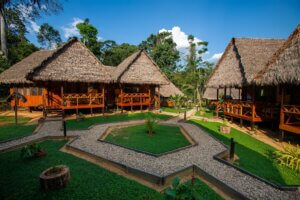Eco-Resorts and Sustainable Spas: The Future of Hospitality Design
The hospitality industry is undergoing a sustainable transformation as travelers become more conscious of their environmental impact and personal well-being. A new wave of eco-resorts and sustainable spas is emerging, offering luxurious experiences that prioritize both nature and wellness.
These destinations blend biophilic design, renewable energy, and holistic health principles to create spaces that enhance relaxation while minimizing ecological footprints. Leading firms like Vera Iconica Denver Architects are at the forefront of this shift, designing hospitality spaces that seamlessly integrate sustainability and wellness.
As travelers seek more meaningful and restorative experiences, eco-conscious hospitality is redefining what it means to escape, unwind, and reconnect with nature.
The Rise of Eco-Resorts in Sustainable Hospitality
Eco-resorts are built with sustainability at their core, focusing on environmental preservation while delivering exceptional guest experiences. Unlike traditional resorts, which often rely heavily on resource-intensive operations, eco-resorts are designed to coexist with their natural surroundings.
Key elements of eco-resorts include:
- Locally Sourced Materials – Buildings constructed with materials like reclaimed wood, bamboo, and natural stone reduce carbon footprints and support local economies.
- Energy Efficiency – Solar panels, wind energy, and geothermal heating reduce reliance on fossil fuels.
- Waste Reduction Systems – Composting, on-site water purification, and zero-waste policies ensure minimal environmental impact.
- Regenerative Landscapes – Native plant landscaping, organic gardens, and reforestation efforts restore ecosystems rather than depleting them.
Eco-resorts not only reduce their environmental impact but also offer guests an immersive experience that fosters a deeper appreciation for the natural world.
Sustainable Spas and Holistic Wellness
Spas have long been associated with relaxation and self-care, but the concept of sustainable spas is taking wellness to a new level. These spaces prioritize natural healing elements, non-toxic materials, and energy-efficient systems to create environments that support both human and planetary health.
Sustainable spas incorporate:
- Natural and Organic Treatments – Herbal remedies, plant-based skincare, and chemical-free therapies ensure a toxin-free experience.
- Water Conservation Techniques – Low-flow showers, rainwater harvesting, and saltwater pools reduce freshwater consumption.
- Eco-Friendly Interiors – Non-toxic paints, VOC-free materials, and sustainable fabrics create healthier indoor air quality.
- Mindful Architecture – Open-air designs, nature-inspired layouts, and indoor-outdoor connections enhance the healing experience.
These spas go beyond relaxation by encouraging guests to adopt sustainable wellness practices in their daily lives.
Biophilic Design in Hospitality Spaces
Biophilic design is central to eco-resorts and sustainable spas, as it strengthens the connection between guests and their natural surroundings. The presence of natural elements has been shown to reduce stress, improve mood, and enhance overall well-being.
This approach incorporates:
- Abundant Natural Light – Maximizing daylight exposure supports circadian rhythms and reduces artificial energy use.
- Water Features – Streams, waterfalls, and reflection pools create a calming atmosphere while naturally cooling outdoor spaces.
- Organic Shapes and Textures – Curved architecture, wood grain finishes, and earthy tones evoke a sense of tranquility.
- Open-Air Concepts – Breezeways, retractable walls, and outdoor lounges seamlessly blend the indoors with nature.
By embracing biophilic design, eco-resorts and spas create environments that feel both restorative and deeply connected to the landscape.
The Role of Smart Technology in Sustainable Hospitality
Technology is playing a significant role in advancing sustainability in hospitality. Smart energy systems, AI-driven climate controls, and automated waste management enhance efficiency while reducing operational impact.
Some key innovations include:
- Smart Room Controls – Motion-sensing lighting, automated temperature adjustments, and intelligent water usage reduce resource waste.
- AI-Powered Sustainability Monitoring – Real-time tracking of energy, water, and waste helps resorts optimize eco-friendly practices.
- Digital Detox Zones – Some eco-resorts encourage guests to disconnect from technology, reducing energy consumption and promoting mindfulness.
- Carbon Offsetting Programs – Resorts now offer guests options to offset their stay’s emissions through tree-planting and conservation initiatives.
Technology is not only making sustainability easier but also enhancing the guest experience through personalized comfort and seamless eco-conscious solutions.
Sustainable Dining and Farm-to-Table Experiences
One of the most impactful ways hospitality spaces can embrace sustainability is through mindful food practices. Farm-to-table dining, zero-waste kitchens, and locally sourced ingredients are becoming defining features of eco-resorts.
Sustainable hospitality dining incorporates:
- On-Site Organic Farms – Many resorts grow their own produce, herbs, and honey to serve fresh, seasonal meals.
- Zero-Waste Initiatives – Creative composting, food donation programs, and minimal packaging reduce waste.
- Wild Foraging Menus – Some eco-resorts highlight native, foraged ingredients that celebrate regional biodiversity.
- Sustainable Seafood Practices – Ethical sourcing ensures ocean conservation while offering guests the freshest catch.
By prioritizing sustainability in dining, eco-resorts provide guests with nourishing, environmentally responsible culinary experiences.
A New Standard for Luxury and Sustainability
The hospitality industry is shifting toward a future where luxury and sustainability are no longer separate concepts. Eco-resorts and sustainable spas are proving that high-end experiences can be achieved without compromising environmental responsibility.
As travelers increasingly seek destinations that align with their values, hospitality brands that embrace holistic wellness and green innovation will lead the industry forward. These spaces are not just places to visit—they are immersive experiences that inspire a more sustainable way of living.
By integrating nature, wellness, and technology, the future of hospitality design is set to redefine luxury in a way that benefits both people and the planet.
